Scratched stainless steel cookware can be a common concern for many home cooks. It raises questions about safety, performance, and longevity.
Stainless steel is a popular choice for cookware due to its durability and ability to withstand heat. However, scratches can appear over time, leading to worries about food safety and cooking efficiency. Many wonder if scratched stainless steel is still safe to use.
Can it affect the taste of food? Does it lead to rust or other issues? Understanding these concerns is essential for anyone who cooks regularly. This blog will explore the implications of scratched stainless steel cookware, offering insights on safety, maintenance, and how to extend the life of your beloved pots and pans.
Credit: www.reddit.com
The Allure Of Stainless Steel Cookware
Stainless steel cookware has a special charm. It combines beauty and strength. Many cooks love its shiny surface and modern look. This cookware is a favorite in many kitchens.
Beyond appearance, its performance is impressive. It heats evenly and is easy to clean. This makes it a practical choice for everyday cooking. Yet, over time, scratches can appear. Understanding this can help you care for your cookware.
Durability Meets Elegance
Stainless steel is known for its durability. It can handle high heat and resist rust. This makes it long-lasting in any kitchen.
- Resists staining and corrosion
- Withstands high temperatures
- Easy to maintain and clean
The elegant look of stainless steel adds style. It fits well with any kitchen decor. Many chefs prefer it for both professional and home use.
Why Scratches Are Inevitable
Scratches on stainless steel cookware can happen easily. Even with care, they appear over time.
- Using metal utensils can scratch the surface.
- Stacking pots and pans causes friction.
- Cleaning with abrasive pads damages the finish.
While scratches may seem bad, they do not affect cooking. They can even add character. Proper care can reduce scratches.
Consider these tips to minimize damage:
- Use wooden or silicone utensils.
- Avoid stacking cookware unless padded.
- Choose gentle cleaning tools.
Embrace the beauty and functionality of stainless steel cookware. It remains a top choice for many home chefs.
Identifying Types Of Scratches
Scratches on stainless steel cookware can happen easily. Knowing how to identify these scratches helps in deciding what to do next. This section will focus on the types of scratches you might find on your cookware.
Surface Marks Vs. Deep Grooves
Scratches come in different forms. Here’s how to tell them apart:
| Type of Scratch | Description | Example |
|---|---|---|
| Surface Marks | Light scratches on the surface. Usually, they don’t affect cooking. | Fine lines that are hard to see. |
| Deep Grooves | Visible scratches that cut into the metal. They may affect cooking. | Deep lines that can catch your fingernail. |
Assessing Scratch Severity
Determining the severity of scratches is important. It helps you decide whether to keep using the cookware. Here’s a simple way to assess scratches:
- Check Visibility: Are the scratches easy to see?
- Feel the Scratch: Run your fingernail over the scratch. Does it catch?
- Consider Depth: Are the scratches shallow or deep?
- Impact on Cooking: Do they affect food? For example, can they trap food?
Understanding these factors helps in maintaining your cookware. Always inspect your stainless steel for both surface marks and deep grooves.
Initial Steps Before Polishing
Scratched stainless steel cookware can look worn and unattractive. Before polishing, take some initial steps. Proper preparation makes a big difference. Follow these easy steps to restore the shine.
Cleaning: The Starting Point
Cleaning your cookware is crucial. It removes dirt, grease, and food particles. Follow these steps for effective cleaning:
- Fill the sink with warm soapy water.
- Submerge the cookware for a few minutes.
- Use a soft sponge to scrub gently.
- Rinse with warm water.
- Dry completely with a soft cloth.
Ensure all residue is gone before polishing. A clean surface helps the polish work better.
Gathering The Right Supplies
Having the right supplies is essential for polishing. Gather these items:
- Stainless steel cleaner
- Soft cloths or microfiber towels
- Baking soda (for tough scratches)
- Olive oil (for a natural shine)
- Non-abrasive scrub pad
Check each item before starting. Using the right supplies makes polishing easier.

Credit: www.reddit.com
Diy Scratch Removal Techniques
Scratched stainless steel cookware can be frustrating. It affects the look of your kitchen. Luckily, many DIY scratch removal techniques can help restore your pots and pans. These methods are simple and use common household items.
Home Remedies That Work
There are several home remedies for removing scratches from stainless steel cookware. These methods are safe and effective. Here are some popular options:
- Baking soda
- Olive oil
- White vinegar
- Toothpaste
The Baking Soda Method
The baking soda method is very effective for scratches. It is easy and requires only two ingredients. You need:
| Item | Quantity |
|---|---|
| Baking soda | 2 tablespoons |
| Water | 1 tablespoon |
Follow these steps:
- Mix baking soda and water to form a paste.
- Apply the paste to the scratched area.
- Use a soft cloth to rub the paste gently.
- Rinse the cookware with warm water.
- Dry thoroughly with a clean cloth.
This method can make your cookware look better. Try it out for yourself!
Commercial Scratch Removers
Scratched stainless steel cookware can be frustrating. The good news? There are commercial scratch removers designed to help restore your pots and pans. These products can remove scratches and make your cookware look like new again. Choosing the right product and applying it correctly is key to achieving the best results.
Selecting A Product
When selecting a commercial scratch remover, consider these factors:
- Type of Scratches: Identify if they are light or deep.
- Ingredients: Look for non-toxic and safe options.
- Brand Reputation: Choose trusted brands with positive reviews.
- Ease of Use: Opt for products that come with clear instructions.
Here’s a quick comparison of popular products:
| Product Name | Type | Effectiveness | Price Range |
|---|---|---|---|
| Stainless Steel Cleaner | Liquid | High | $$ |
| Scratch Repair Kit | Paste | Medium | $$$ |
| Steel Wool Pads | Pad | Medium | $ |
Application Tips For Best Results
Follow these tips for effective application:
- Clean the Cookware: Start with a thorough cleaning.
- Test the Product: Use it on a small area first.
- Apply Evenly: Use a soft cloth or sponge.
- Use Gentle Pressure: Avoid pressing too hard.
- Buff the Area: Use circular motions for a polished look.
- Rinse and Dry: Clean off any residue afterward.
By following these steps, you can effectively restore your stainless steel cookware. Enjoy cooking with your refreshed pots and pans!
Credit: www.reddit.com
Preventive Measures For Future Care
Protecting your stainless steel cookware from scratches is essential. Simple steps can help maintain its shine. Proper care ensures your cookware lasts longer. Follow these tips to keep your cookware looking new.
Proper Cleaning Practices
Cleaning your stainless steel cookware correctly is vital. Use soft sponges and mild detergents. Avoid abrasive cleaners that can scratch the surface.
- Always let your cookware cool before cleaning.
- Wash with warm, soapy water.
- Rinse thoroughly and dry with a soft cloth.
For tough stains, make a paste of baking soda and water. Gently scrub the area with a soft cloth. Rinse and dry well. This method is safe for stainless steel.
Avoiding Common Mistakes
Some habits can damage your cookware. Be aware of these common mistakes:
| Common Mistake | Impact | Prevention |
|---|---|---|
| Using metal utensils | Scratches and marks | Use silicone or wooden utensils |
| Overheating | Warping and discoloration | Use medium heat settings |
| Storing with other cookware | Scratches from contact | Use cloth or paper between items |
Following these steps helps avoid damage. Treat your cookware with care. Enjoy cooking with beautiful, scratch-free stainless steel.
Professional Restoration Services
Scratches on stainless steel cookware can be frustrating. They can affect the look and performance of your pots and pans. Professional restoration services can bring your cookware back to life. Experts use special tools and techniques to repair scratches. This service saves you from buying new cookware.
When To Call In The Experts
Not all scratches need professional help. Here are signs you should consider calling in experts:
- Deep scratches that catch your fingernail.
- Discoloration around the scratch.
- Rust or corrosion on the surface.
- Multiple scratches that affect cooking.
If you notice any of these signs, seek help from professionals. They can assess the damage and recommend the best solution.
Cost Vs. Benefit Analysis
Understanding the cost of restoration is important. Here’s a simple table to compare costs and benefits:
| Service | Estimated Cost | Benefits |
|---|---|---|
| Deep Scratch Repair | $50 – $100 | Restores cookware to like-new condition. |
| Polishing Service | $30 – $80 | Enhances shine and removes light scratches. |
| Full Restoration | $100 – $200 | Comprehensive fix for severe damage. |
Consider the long-term benefits. Restored cookware can last many more years. This can be more cost-effective than buying new cookware. Think about your budget. Weigh it against the benefits of restoration.
The Impact Of Restored Cookware
Restoring scratched stainless steel cookware can change your kitchen experience. It enhances both performance and appearance. Many people do not realize how much restored cookware can improve their cooking life.
Cooking Performance
Restored cookware performs better in many ways. Here are some benefits:
- Heat Distribution: Smooth surfaces heat evenly.
- Non-stick Qualities: Restoring can reduce sticking.
- Durability: Proper care extends the life of your cookware.
When the surface is scratched, food can stick. This makes cooking harder. Restoring the cookware can help regain its original qualities.
Aesthetics And Resale Value
Looks matter in the kitchen. Restored cookware shines and looks new. This can make your kitchen more inviting.
Here’s how restoration affects resale value:
| Condition | Resale Value |
|---|---|
| Scratched | Low |
| Restored | High |
Investing time in restoration can lead to higher resale values. Buyers prefer cookware that looks good and performs well. A polished set can attract more attention.
Frequently Asked Questions
How Can I Remove Scratches From Stainless Steel Cookware?
To remove scratches from stainless steel cookware, use a non-abrasive cleaner or baking soda paste. Gently rub the mixture with a soft cloth in the direction of the grain. Rinse thoroughly with water and dry to restore shine. This method is effective for light scratches.
Is Scratched Stainless Steel Cookware Safe To Use?
Yes, scratched stainless steel cookware is generally safe to use. Stainless steel is durable and resistant to bacteria. However, deep scratches may harbor food particles, so it’s essential to clean thoroughly. Regular maintenance can help prevent further scratching and ensure longevity.
What Causes Scratches On Stainless Steel Cookware?
Scratches on stainless steel cookware can occur from metal utensils, abrasive cleaners, or rough surfaces. Using sharp or hard materials can easily damage the surface. Additionally, stacking pots and pans without protection may lead to scratches over time.
Can I Polish Scratched Stainless Steel Cookware?
Yes, you can polish scratched stainless steel cookware. Use a stainless steel cleaner or a homemade solution of vinegar and baking soda. Apply with a soft cloth, rubbing in the direction of the grain. This will help minimize the appearance of scratches and enhance shine.
Conclusion
Scratched stainless steel cookware can be a concern for many cooks. Damage may seem permanent, but it isn’t always the case. Simple cleaning methods can restore the shine. Using the right tools helps prevent new scratches. Choose non-abrasive pads and gentle cleaners.
Proper care can extend the life of your cookware. Enjoy cooking with stainless steel without worry. Keep your kitchen looking great and your meals tasty. Remember, a little care goes a long way. Happy cooking!

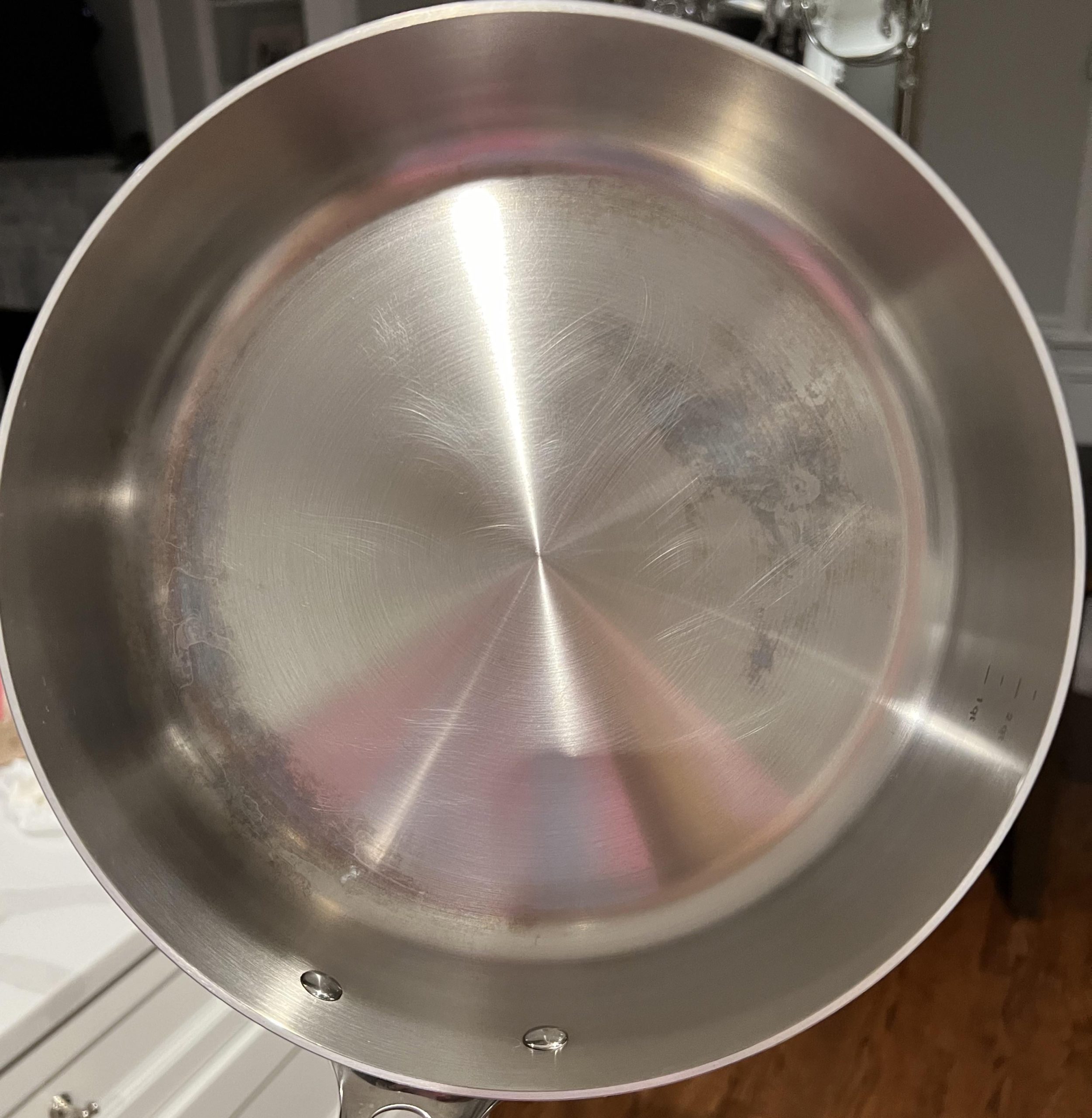
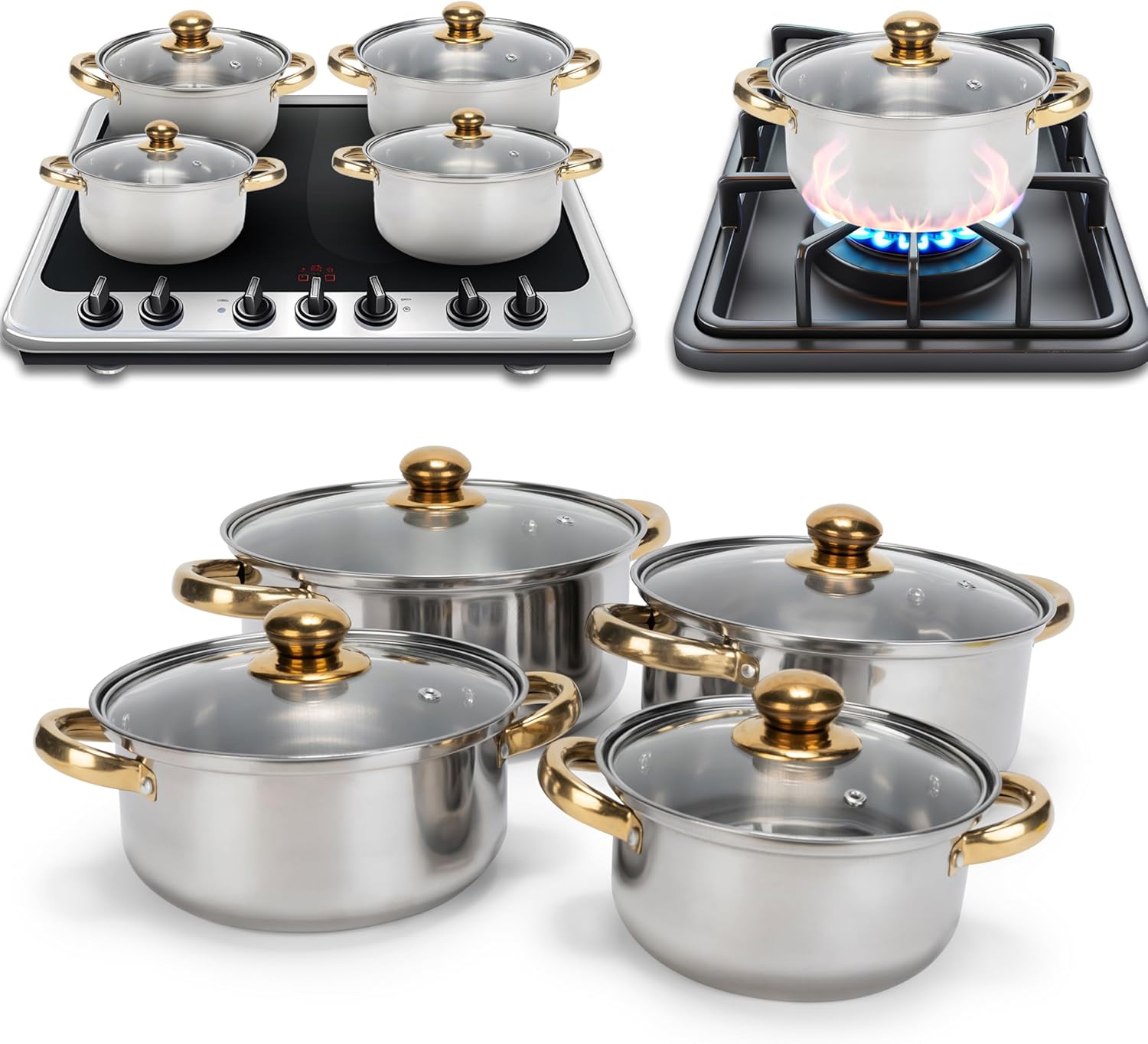

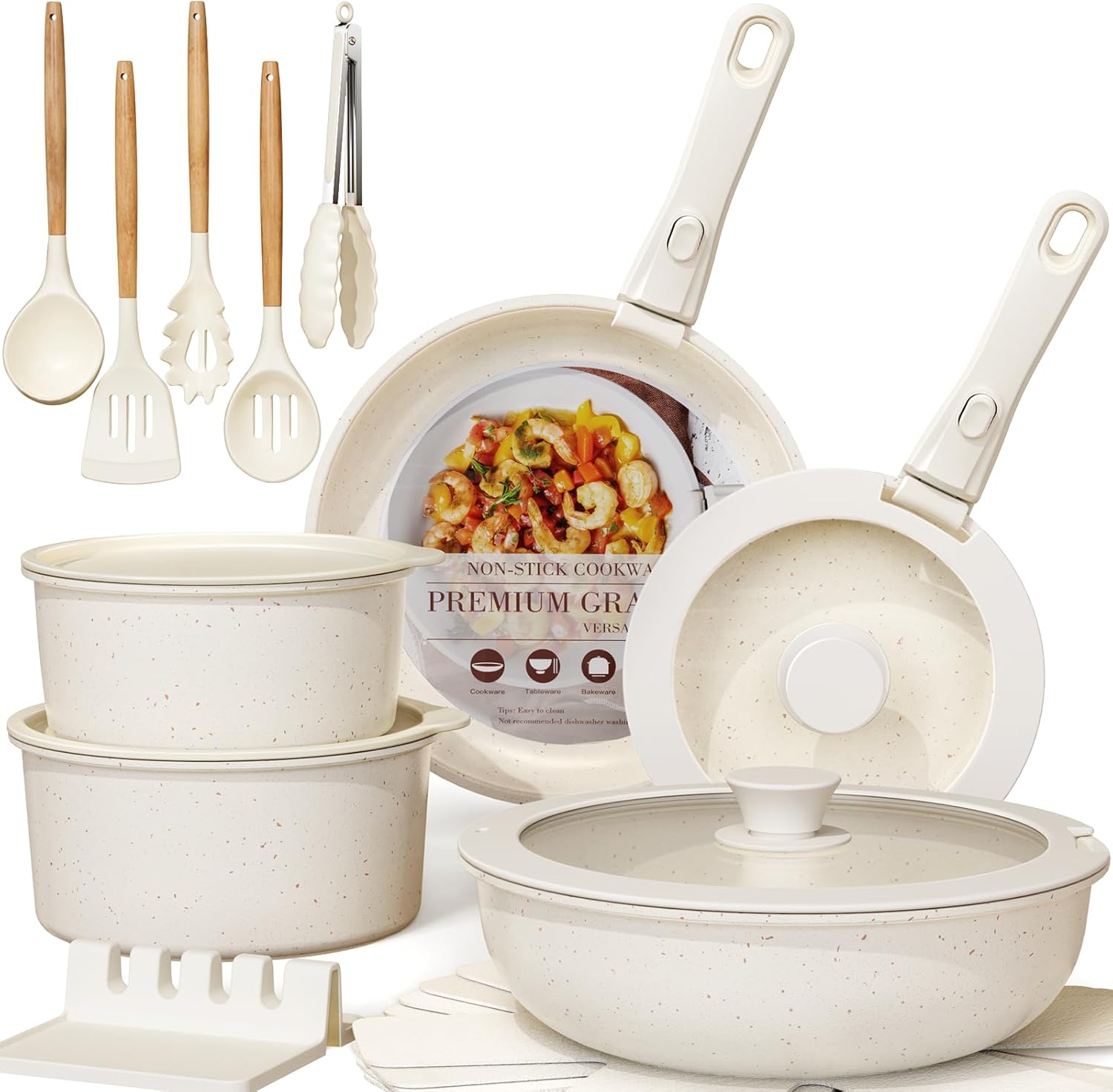
Leave a Reply